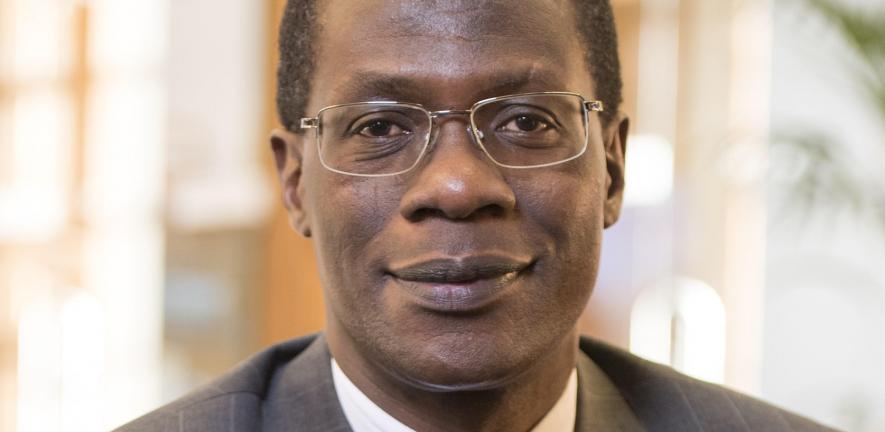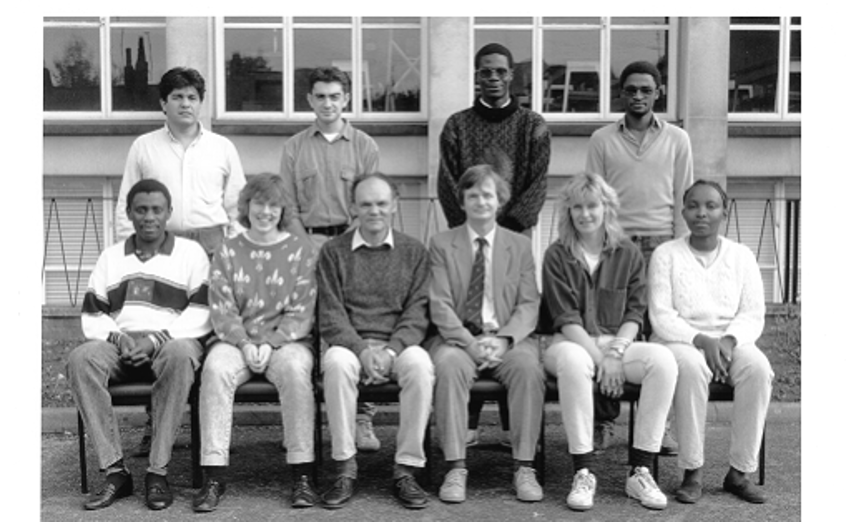
He talks about his journey as a scientist starting in Nairobi, his vision for the future of chemistry and everything that’s happened in between.
Materials at Nottingham
Robert has been Provost and Deputy Vice-Chancellor at the University of Sheffield since 2024. Previously he was Prof. of Materials Chemistry at the University of Nottingham where he had been since he left the Department in 2000.
After his PhD on porous clays in the Department (1992), Robert held a Junior Research Fellowship at Trinity College (1992-1996) and an Engineering and Physical Sciences Research Council Advanced fellowship (1996-2001) during which he left Cambridge and continued research on sustainable porous materials with his Group at Nottingham and now in Sheffield. He develops simpler and cheaper methods to synthesise materials that are essential in renewable and sustainable energy applications. His work has led to improvements such as increasing hydrogen storage or CO2 capture and storage (CCS) in porous materials.
University of Nairobi
Years before he started his research journey in the Department, Robert grew up in Kenya and studied chemistry at the University of Nairobi.
“The University of Nairobi has changed significantly since my time there but when I did my undergraduate degree, we spent a lot of our time without any equipment and were only able to imagine how to use, for example, an IR spectrometer.
“If there was equipment then it was usually one unit and only the technician could use it, so we could only watch. Back then it was very different to the experience of being an undergraduate in the UK. The difference has shrunk since then.
“I had a wonderful time at the University of Nairobi and the chemistry degree was great and it stretched us. I still have strong links with my alma mater.”
The Jones Group

The Bill Jones Group in 1989. Robert is back row, third from the left. Bill is front row, fourth from the left
After his first degree, Robert worked for a short time with Unilever researching how to clean up cooking oil with porous clay materials. He had an inclination to study longer. While wandering the pavements of the University of Nairobi, he saw an advert for Cambridge PhD scholarships on a noticeboard and decided to apply. This is how he came to join Prof. Bill Jones’ Group studying porous clays.
“It was a coincidence that when I came to Cambridge, the project Bill Jones had for me was on clays and how they work as adsorbents at the molecular level for refining edible oils, the very same materials I had been using in my Unilever job in Nairobi to refine vegetable oils at scale for the Kenya and East Africa market!
“I want to highlight that my time in Cambridge was key in how I have developed my career. Working with Bill and then spending time in my first position as a Junior Research Fellow at Trinity College set me up to always allow myself to think along the lines of: I can do this! I can do that! and not to limit myself with respect to my goals. I never know quite how I’m going to do it, but the first step is thinking that I can do it.”
Life in Cambridge

The Bill Jones Group in 2000. Robert is back row, fifth from the left. Bill is back row, third from the left
Outside the laboratory, Robert played a lot of squash at the Trinity College Grange Road squash courts and has fond memories on the Cam punting with friends to Grantchester for picnics and back.
Over the years, Robert has supervised many students and his motto is that there is always something new to learn. He is keen to help students realise their potential regardless of where they come from or their background.
“In Bill, I learned what it was like to have a great supervisor who listened, encouraged us to innovate and created a close community and these are lessons I try and bring to my students now.”
Representation and Diversity Advocacy
Robert has been working with the RSC exploring equity and inclusion within the chemical sciences and found clear gaps in representation in the chemical sciences community.
“The chemical sciences are not using the full diversity of available talent and that has been the spur for me to shine a light on inclusion and equality.”
The RSC has started working on initiatives supporting underrepresented groups. An example of such an initiative is Broadening Horizons, a pilot programme which is now into its fourth year. The programme targets students from Black and minority ethnic backgrounds who are early in their science career and offers them insights that encourage them to aspire to the very highest level in the Chemical Sciences. It offers industrial placements and mentorship. The programme has supported over 300 scholars so far.
Future Appointments and Vision
Robert will be stepping into the Presidency of the RSC in 2026 after being elected last year following a period as President-Elect (2024 – 2026).
Sharing his vision in the RSC’s role, he states: “For me, the RSC has been very important in my professional career, so I hope to see the organisation continue to be the trusted voice of chemical scientists in the UK and globally. I want us to be at the forefront of conversations on finding solutions to current challenges, be that climate change, sustainability, or equality in participation in the chemical sciences.”
In response to emerging trends, he says: “We are a publisher and are moving towards open access where we want to be seen as a leader that others can trust and follow. We also want to be at the forefront of game-changing trends such as in artificial intelligence and stay active in these conversations.”
This article was originally published in Chem@Cam magazine Issue 70.

